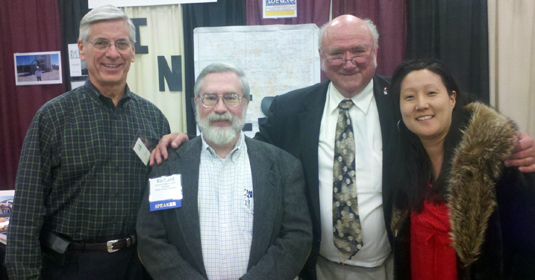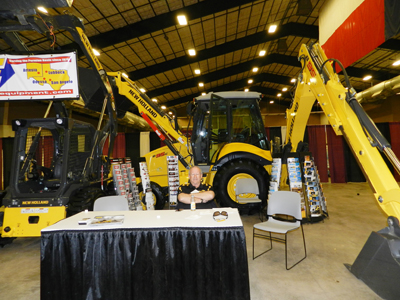An address on entrepreneurship by Dick Saulsbury highlighted the Burmass Tools of the Trade Expo.
First you have to find the thing you believe in.
Those were the words of Dick Saulsbury, keynote speaker at the 2013 Burmass “Tools of the Trade” Exposition, held Feb. 28-March 1 at the Horseshoe Arena in Midland.
Saulsbury, whose Odessa-based enterprise Saulsbury Industries (SI) generates more than $400 million in annual revenues and covers the contracting gamut of engineering and design, construction, electrical and instrumentation, is a Permian Basin success story and one of the region’s most respected innovators and leaders.
His luncheon address underscored the values of faith and family, as well as love of country—traits for which Saulsbury has long been known.
Describing entrepreneurship as “a moral calling,” he emphasized the need to count the cost. He acknowledged the need at times to accept risk as a necessary element in the equation. And of course he prescribed hard work.
“Work is the greatest remedy available for mental or physical affliction,” Saulsbury said. “No one was killed by hard work. Some might take it hard, but no one was killed by it.”
Interestingly, he contrasted entrepreneurship with speculation.
“In my mind, an entrepreneur is someone who considers the consequences of whatever actions they take, and they make sure that those don’t have a negative impact on the community—that they minimize or mitigate any [negative] outcomes that could happen,” he said. “Meanwhile, speculators tend to come from outside the community. They generally have little regard for what happens, for the detrimental consequences, whether intended or unintended. We need to think more of helping entrepreneurs and less of helping speculators.”
Saulsbury paid tribute to numerous sources in his speech, including Dr. Ben Carson, whom Saulsbury had recently heard at an Austin event. The businessman mixed anecdotes of his personal experiences with advice from a diverse range of thought leaders. He ended with these words:
“So it goes, that you and your colleagues who serve the vibrant oil and gas business today are standing with those visionaries who came before, who came and made West Texas the economic envy of America. And it’s been done in our time,” he said.
“Thank you for what you have done,” he added, remarking that he believed people such as those in the room will continue to face new challenges and prevail over them.
In other talks, local professionals shared their insights on a variety of subjects.
The first presentation of the day came from Richard J. Erdlac, Jr., Ph.D., P.G., who operates Erdlac Energy Consulting. His message on “Heat Capture to Improve Oil and Gas Revenue” tackled some cutting edge subject matter. (Erdlac is authoring an article on this topic that will appear in the May 2013 PBOG).
As Erdlac remarked, “Directional drilling has opened up a lot more production of the single well and has decreased the cost—the operating cost—when it comes to production. Shale frac’ing techniques have introduced something new and unique. When I started in the business, shale was a seal not a reservoir. Now it is a reservoir and a seal, still… We’ve seen major changes there… The geo-science software has matured also, be it for mapping sub-surface or for other work like well logs.”
Erdlac noted that mapping and reservoir modeling have improved considerably, enabling [oil and gas professionals] to have a much better idea of what’s happening in the reservoir.
But his real subject was waste. “Waste heat,” energy that need not always be “waste.”
Said Erdlac: “What I’d like to suggest is capturing waste energy is something that the industry really needs to start looking at because it’s improved efficiency, which means improved dollars in the end product that you end up having and giving you a greater product stream in general.”
See our accompanying sidebar for more in that vein.
The second speaker of the day, Jay Wright, president of Polyflow, discussed the numerous challenges faced by producers in the Permian Basin, an environment that is notoriously hard on hardware and, especially, pipes. His topic, “Reinforced Thermoplastic Pipes in Paraffin Applications,” covered alternative methods in flexible pipeline for oil and gas transfer, including differences in liners, reinforcements, and applications.
That ended the morning session, and following Saulsbury’s luncheon message, Ken Goldsmith spoke on “Going Green on Your Own Volition.” Goldsmith, owner of Mudsmith, Inc., was the subject of a September 2012 cover story in PBOG.
 Several years ago, Goldsmith decided to take steps to run an environmentally friendly facility. Tapping a West Texas entrepreneurial spirit, he decided to “go green.” His talk covered all the ins and outs of that process, and the lessons he learned along the way.
Several years ago, Goldsmith decided to take steps to run an environmentally friendly facility. Tapping a West Texas entrepreneurial spirit, he decided to “go green.” His talk covered all the ins and outs of that process, and the lessons he learned along the way.
Capping the day’s presentations, Jimmy Wright, CPL and Land Manager/Permian Basin, Callon Petroleum Company, spoke on “Non-Traditional Permitting: Drilling in City Limits.” As he noted at the outset, advances in exploration technology have prompted some companies to develop reserves in relatively populated areas. Wright addressed some of the unique issues associated with gaining a drilling permit within an incorporated city.
The sponsors of the day’s offerings were Superod, Finley Investigations and Security, FlexRod, Town Square Media, Burmass Directory, and this magazine. Sponsor of the luncheon was Superod.
For many more photos from the conference, view our full digital issue.









